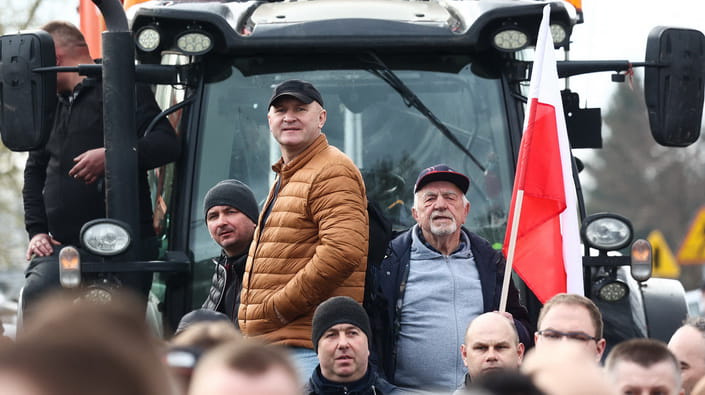EU Mistake and Farmers' Lobby: Polish Business Perspective Agrarian Conflict with Ukraine

Why did the Polish government impose restrictions on Ukrainian agricultural exports? What consequences will this ban have?
"European Pravda" has repeatedly analysed the agrarian crisis that erupted between Ukraine and the EU, with Poland being the starting point of this crisis.
It's time to hear from the Polish side: President of the Polish Entrepreneurship and Employers' Confederation (ZPP), Cezary Kaźmierczak, answered our questions.
His understanding of the current crisis reasons significantly differs from the Ukrainian side. However, he positively assesses the possibilities of overcoming it and deepening business cooperation between both countries in Ukraine's post-war recovery.
The grain crisis
The current situation in trade between Ukraine and Poland is somewhat similar to the migration situation that arose at the beginning of the full-scale Russian invasion.
Back then, Ukrainians were fleeing the war en masse and Poland opened its border. In total and within very short time frame, about 2 million Ukrainians entered the country. We saw it as our duty to help them, in particular, I took in five people to my home right from the railway station.
And this situation was not only with refugees, but with everything. Including grain. When it became clear that Ukraine was having problems exporting its grain, we just said, "Go ahead, go ahead. Yes, even then, Polish farmers were not happy about it, but this could not influence our decision.
Now about the other side of this problem. Ukrainian farmers started selling their products in Poland for much cheaper than usual.
It would be the same if I came to Kyiv and started selling bread below the market price. Kyiv residents would probably be happy, but Kyiv bakers would not.
Finally, we should not forget that Poland will soon have elections. At the moment, we do not have a single respectable political force that would oppose assistance to Ukraine. However, there are groups that are trying to play on this.
To summarise, I do not consider this problem to be mainly economic – exports via Poland and transit through it account for only 11.3% of Ukraine's total grain exports.
Ukrainian exports do not threaten large Polish agricultural companies. On the contrary, they are interested in working with Ukrainian raw materials. It is cheap and of good quality, so it is interesting to work with it. There is a certain problem – we need to build additional facilities to process these raw materials, but I see interest in such investments from Polish businesses.
Only small farmers face problems here. They don't have a significant share in the economy, but they are more powerful politically.
And most importantly, they are quite loud, and this is of additional importance in the pre-election period.
That is why I believe that this problem should be considered political rather than economic.
And to avoid political consequences, we just had to take a break and see how to resolve it. Therefore, the decision of the Polish government is not sustainable.
Moreover, the situation with transit has already been resolved - transit through Poland has already been restored.
The only thing left to be resolved is the issue of domestic sales - this will be resolved, it just takes a little more time.
I can't say whether this problem will be resolved by 5 June. As Woody Allen used to say, forecasting is difficult because it concerns the future.
The difficulty lies in the fact that politics has a greater influence on the solution of this problem than economic feasibility. In particular, if the politicians of the two countries act like roosters, simply attacking each other, this will not help to resolve the problem quickly.
And again, there will be elections in Poland this year. There are certain groups, not parties, but only certain groups, that want to make the issue of Ukrainian grain a factor that will influence the outcome of these elections, although they have not succeeded so far.
But I can assure you that there is a desire on the Polish side to resolve this issue as soon as possible.
And Polish businesses will put pressure on the government to find a solution. It is difficult to say whether it will be quotas or something else. But it is in our common interest to find a way out of this crisis. Otherwise, both we and you will lose.
How to solve this problem
Soon, a special government representative will start working in Poland to establish links between Ukrainian and Polish businesses.

This shows that the Polish business is interested in Ukraine. Among other things, they are interested in working with Ukrainian grain.
Some of the current problems have arisen because of our infrastructure's unpreparedness to accept such a large amount of grain. We offered our services without considering whether we could handle the work.
Poland currently lacks sufficient railway logistics, no storage facilities, no transshipment points.
But, again, there is interest from the Polish business. Therefore, business simply needs time to build all the necessary facilities. And where they cannot build it themselves, they put pressure on the Polish government.
Here I want to dispel a certain myth that Polish business, unlike the state, is not interested in Ukraine's integration into the EU because it is afraid of competition.
On the contrary,
Polish business remembers how Germany and German business profited from our accession to the EU.
Therefore, it sees Ukraine's accession to the EU not as a challenge but as an opportunity. Including an opportunity to make money on it.
The EU's mistake in trade with Ukraine
I think you will agree with me that Ukraine's current priority is to start negotiations with the EU on membership. After all, candidate status does not mean much by itself. Turkey has been unable to complete pre-accession negotiations until this very day.
Kyiv wants to start them without waiting for the war to end. And Warsaw supports you in this.
But at the same time, Ukraine is resolving its trade issues with the EU.
In order to support Ukraine, the EU agreed to temporarily zero all duties, first for a year, then it was extended for another year.
And in my opinion, this decision of the EU is a bit of a mistake.
Instead of entering into a long-term process by prescribing a gradual increase in export quotas and zeroing of duties - this is the way Poland and many other countries have been going to the EU - a political decision was made to open the market for a year in Ukraine.
I would like to point out that this was a political decision that did not involve the gradual opening of markets. It was made in the context of urgency and for a short period of time. And no one knew what would happen after this year had passed: whether these preferences would be extended or simply said ‘goodbye’.
The option of offering Ukraine not an immediate but temporary market opening, but a process of gradual opening, would have been much more useful.
This is the path that Poland took to join the EU. In our case, it took about 10 years, and moreover, the process of liberalisation continued even after we joined the EU.
If Ukraine had followed this path, the gradual opening of the market for your exports would not have caused political problems in Europe.
Moreover, when Poland was joining the EU, our advocate was Germany, and it is a very powerful advocate. Now your advocate is Poland, but we are not as influential as Germany. And this should also be taken into account.
Post-war recovery of Ukraine
This interest does not just exist - Polish business is ready to invest in Ukraine right now, without waiting for the war to end. In particular, a project has already been launched in Ukraine that will accumulate projects that may be of interest to Polish business.
I currently see three areas where we can be particularly active. These are the construction sector, food processing, and, of course, the defence industry.
Cooperation in the defence sector is already very active. And it has prospects, as we are not competitors here, but rather can strengthen each other.
I also cannot but mention another project of ours - the Business for Ukraine Centre. Under this programme, we help Ukrainian businesses enter the Polish market, achieve success there, and then move on to other European countries.
I would like to point out that this is not a relocation, unlike a similar project for Belarusian companies, but rather the opening of a new market. Thus, Poland will become a gateway for Ukrainian businesses to enter the large EU market.
Interviewed by Yuriy Panchenko,
Editor, "European Pravda"
